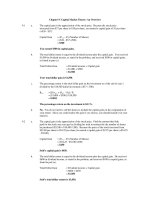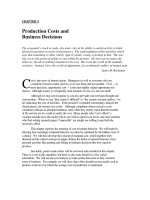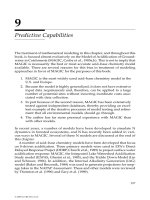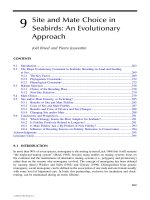Multicultural chapter 9
Bạn đang xem bản rút gọn của tài liệu. Xem và tải ngay bản đầy đủ của tài liệu tại đây (78.79 KB, 10 trang )
CHAPTER 9
MULTICULTURAL
EVIDENCE-BASED
PRACTICE
Evidence Based Practice
and Multiculturalism
The importance of evidence-based practice (EBP) is
becoming increasingly accepted in the field of
multicultural psychology.
Although there is optimism about the convergence of
these forces, there is still resistance to EBP among some
individuals within the field.
Conflicts often exist between the values espoused in
conventional psychology and the cultural values and
beliefs of ethnic minorities.
Empirically Supported
Treatment
Empirically supported treatment (EST) typically involves a
very specific treatment protocol for specific disorders and is
conducted using manuals.
Cultural adaptations of ESTs are becoming common.
Empirically Supported
Treatment
Cultural adaptions can include factors such as:
matching language, race, or ethnicity;
incorporating cultural values in the specific treatment
strategies;
utilizing cultural sayings or metaphors in treatment; and
considering the impact of environmental variables such as
acculturation conflicts, discrimination, and income status.
Empirically Supported
Relationships
The empirically supported relationship variables
include:
*Strong therapeutic alliance
*Strong interpersonal bond
*Empathic relationship
*Effective management of countertransference
Evidence-Based Practice and
Diversity Issues in Therapy
Evidence-based practice (EBP) refers to “the integration of
the best available research with clinical expertise in the
context of patient characteristics, culture, and preferences”
(APA, 2006).
Evidence-Based Practice and
Diversity Issues in Therapy
In EBP, the selection of intervention occurs only after
individual characteristics such as cultural background,
values, and preferences are assessed.
Because the focus is on the client and the consideration of
cultural variables, EBP sets the stage for a multiculturally
sensitive counseling relationship.
Implications for
Clinical Practice
Know that multicultural counseling and EBP need each
other to provide legitimacy.
Be aware that it is essential to consider the cultural beliefs
and values of the client and that relational counselor styles
may need to vary according to the client’s cultural
background.
Know that integration of EBP and multiculturalism is
resulting in an explosion of research. Mental health
professionals must familiarize themselves with the literature.
Implications for
Clinical Practice
Identifying treatments is only one step in a complex
process; considering contextual and cultural influences
and therapist-client relationship factors is essential.
Know that culturally competent counseling and therapy
are more than a technique-driven search; the therapeutic
relationship is crucial to therapeutic outcome.
Be prepared to modify your therapeutic style to be
consistent with the cultural values, lifestyles, and needs
of culturally diverse clients.
Implications for Counseling
Realize that the concept of cultural competence is more
inclusive and superordinate than is the traditional definition
of “clinical competence.”
Realize that organizational/societal policies, practices, and
structures may represent oppressive obstacles that prevent
equal access and opportunity. If that is the case, systems
intervention is most appropriate.
Use modalities that are consistent with the lifestyles and
cultural systems of clients.









